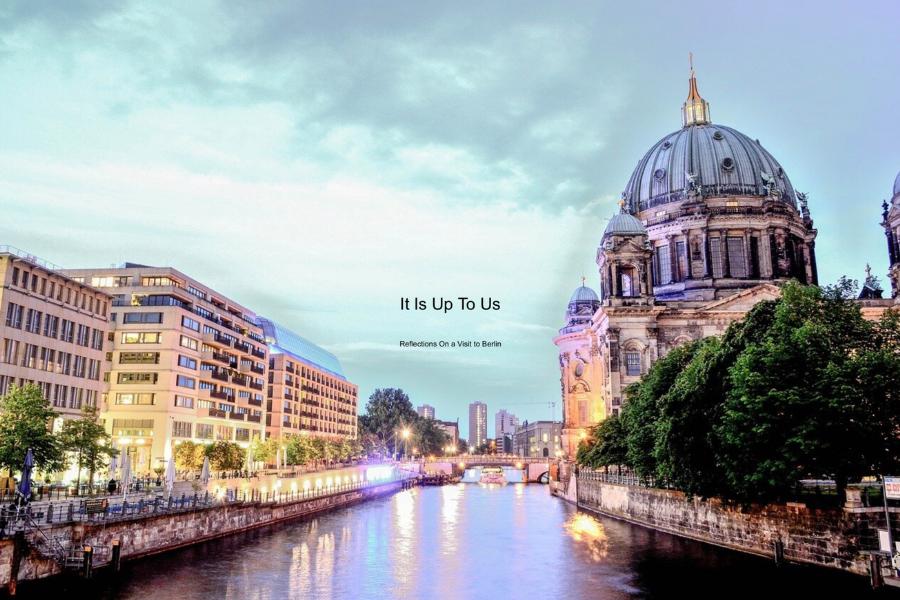
By Sharon Booth, Solutions Not Sides Founder & Director
I wanted to reflect on my recent first visit to Berlin – a beautiful city with wonderful, warm and welcoming people. But my visit came in the wake of the recent terrible attack on a synagogue in Halle, and against the backdrop of a rise in the far right in Germany and across Europe; a hatred for Jews, Muslims, immigrants and all minorities festering away in the dark reaches of our societies that is higher than it has been since the end of WWII. Although the Berlin Wall fell 30 years ago, many literal and imagined walls between communities in Germany and across the world remain.
I was in the city for a meeting of the newly formed ‘European Network Countering Antisemitism Through Education’. Throughout the few days, we reflected upon both historical and contemporary forms of Antisemitism - a sobering and emotional reminder that we must never be complacent and think that the struggle against anti-Jewish hatred has been won. We have come a long way since the 1940s, but as generations pass, memories can fade, and there are now very few alive who were old enough then to understand and remember the horror and suffering of those years.

The Halle Synagogue, where last month’s attack took place. (Source: Wikimedia Commons)
One of the organisations present was the wonderful Anne Frank Trust (https://annefrank.org.uk/), and I took this reflection time to re-visit the life of the girl whose book so inspired me as a teenager. A girl whose flair, wit and intelligence leap from the pages of her diary, and yet who was so clearly vulnerable and struggling with coming to adulthood, as we all do at that age. A girl who went through the suffocation of never stepping outside of a building for two years and looked longingly through dirty windows at the sky. A girl who went through the terror of arrest and separation from those she loved. A girl who was forced to endure the indignity of being stripped, shaved and tattooed as a criminal. A girl who lived in conditions of suffering that I can’t even imagine, with witnesses in her final weeks describing her as emaciated and shivering with cold. A girl who died of an extraordinarily painful and gruesome illness with no access to even the most basic of healthcare. A girl that, but for an accident of birth, could have been any of us.
The hugely encouraging and uplifting element of this visit to Berlin was that all of the people I met were an inspiration and we learned from each other. One of the most important techniques that shone through programme after programme that was presented from the various practitioners revealed that all of us, through years of experience in this field, have discovered shared methodologies that all of our impact evaluations and participant feedback is confirming: that if you form real, caring relationships with people from other communities, other belief systems, other languages and other cultures, prejudice falls away. Hatred for the out-group becomes impossible when there is no out-group. Dehumanisation becomes impossible if every ‘group’ is represented in your life by human beings who are friends and loved ones.

Tributes outside the synagogue in Halle, Germany. The attack left two people dead. (Source: Filip Singer/EPA)
It’s the Twenty-First Century, not the Twentieth. Due to our neophobic natures, there will always be some who resist change. Relapses into tribal ignorance and what feels familiar and comfortable are inevitable. But the move forward is, and will continue to be, inexorable. The amazing people in this network are not just educating the next generation, they are moulding emotionally intelligent, informed, creative, empathic young people, who have the skills to navigate and embrace complexity and to see diversity of identity and opinion as an opportunity for insight rather than a threat. They are doing this through peer-to-peer encounters, art and film exhibitions, online exchanges, doing research and gathering evidence, critical-thinking, problem-solving, and sharing real-life stories with honesty and vulnerability – not just about times when they were discriminated against, but also times when they recognised they harboured prejudice towards someone else.
Another couple of decades, and the forties will be back. It is up to us to decide that this time, they will be different, and that 2039 will look nothing like 1939. Multiculturalism must become inter-culturalism, the mono-lingual must become multi-lingual, one-dimensional beliefs and conspiracy theories must be exposed under the scrutiny of evidence-based questioning, hatred must be replaced by curiosity and openness, and fear must be driven out by recognition and relationship. In twenty years, today’s teenagers will be Europe’s mature citizens and leaders. They still have the chance before them of a future that was cruelly ripped from Anne Frank by the generation before her. By the time she was born in 1929, the world that generation had created through the choices their societies had made meant that when she should have been looking into her future with anticipation and excitement, she was left staring into the mouth of hell. The choices that the members of this Network are making with their dedication and hard work will help to ensure that, for those born in 2029, there will still be a world worth living in. This painting of Anne as an elderly lady and successful author in the mirror of ‘what could have been’, commissioned by the Anne Frank Trust, is a poignant reminder of the right to a life that we all deserve.